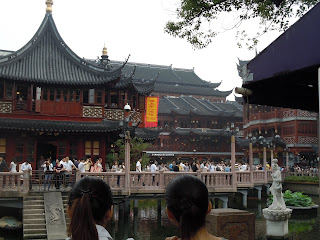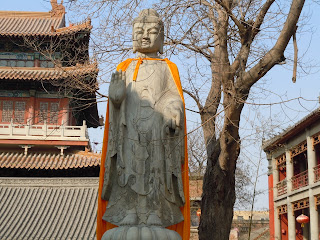It’s been a few months since I got back from China. Throughout the summer, I’ve been able to use journal notes, memory, and photographs to catch up on my blog, which sadly I was not able to update regularly do to the difficulty of accessing BlogSpot in China (the Great Firewall) and problems with my own computer. I’ve decided to add this entry to reflect on how I’ve readjusted to life in America and how what I learned in Harbin has influenced me since I came home.
Right away the Chinese I’d learned came in handy. After a three hour layover in Tokyo, I was on a plane back to America when one of the passengers came down sick. The airplane staff asked if anyone was bilingual in English and Chinese. I came forward and translated for the sick passenger who said that she was having heart palpitations (we had just come through some awful turbulence) and needed to lie down. They brought her to an empty seat in business class. Once she had recovered, the flight attendants came over and thanked me for translating. They even gave me a bottle of wine!
Back in New York, I found work as a tour guide on the double decker tour buses. Right away I used my Chinese skills to communicate with the bus drivers, 75% of which were Chinese. Since the job depended heavily on cooperation with the bus drivers, being able to communicate with them more easily was really helpful. For instance, if I wanted the bus to go slower so I could point out sights better or speed up in an area with fewer sights to talk about, I was able to let the driver know this. I also learned some Cantonese from the bus drivers. Mostly, I used my Mandarin to have discussions with the bus drivers while hitching rides back to Brooklyn late at night or heading to certain locations on what were called “deadheads” or empty buses sent to stops which were especially crowded at certain times of day. I learned a lot about life from those conversations, be it the bus drivers’ view on women and love, or their view on the owner of the company. We chatted about life in America, cheap tourists, tourists who tipped generously, and the weather. Later, I also did two all day private tours in Chinese, one for a family from Taiwan and another for a group of travelers from Beijing.
Since March 2010, I’ve volunteered on and off with two organizations in New York City, the Chinese Staff and Workers Association, and the National Mobilization Against Sweatshops. The organizations both operate as workers’ centers on the Lower East Side and focus on a variety of campaigns from organizing restaurant and garment factory workers to fighting gentrification and unfair development in the city. Over the past thirty years, their battles have brought them into conflict with various employers, the Triads (Chinese mafia), Mayor Bloomberg, developers, and also many other organizations. My Chinese and Spanish language skills have allowed me to volunteer regularly there and learn a lot more about New York City, especially the economic and political issues in the city. I have been deeply influenced by their philosophy, particular the organizations’ belief that the leadership for change in America will come from the super-exploited, the undocumented immigrants, women workers, and people of color as opposed to the middle class, the working class, or the well-educated. That’s not to say that the well-educated don’t have a role to play in bringing change to American society (the rezoning plan the organizations have been pushing to stop the trend of displacement in the Lower East Side was drafted by Hunter College professor Thom Angotti), but the leadership for that change will always come from those with the least to lose and fresh perspectives birthed from their experiences. For instance, immigrants have a wide perspective, because they’ve experienced life in two different countries and often bring fresh ideas. This is true not only of Latino and Chinese immigrants in New York City today, but also of immigrants throughout America history. Jewish, Italian, Russian, Polish, and Irish immigrants in America during the 19th and early 20th centuries were the ones who fought for rights we now take for granted.
Now I’m getting ready to go back to Yale. I know I definitely want to take at least one more semester of Chinese there and many more China-related courses. I’m excited about continuing my studies at Yale and readjusting to life in New Haven.
In the end, I’m extremely grateful to the Light Fellowship for this once in a lifetime experience.

















































